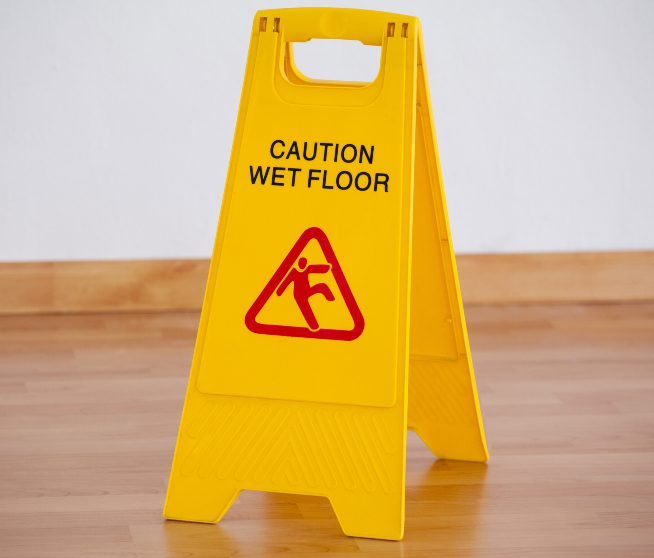Understanding Colorado’s Wet Floor Sign Laws

The presence, or absence, of a wet floor sign can be a determining factor in the direction a Colorado slip and fall case goes. If you want to hold a property owner legally liable for your slip and fall case, then it will come down to being able to prove that the property owner failed to take reasonable care to prevent an accident. All of these factors combined will determine what you are able to recover for your claim.
Colorado personal injury and worker’s compensation law firm, Mintz Law Firm, is familiar and experienced with the importance of being able to provide the above evidence in a slip and fall case. Keep reading to learn more about how a wet floor sign may positively or negatively affect a slip and fall case.
Does Colorado Law Require a Wet Floor Sign?
Colorado law does require a wet floor sign when it is considered reasonably necessary to protect any visitors from hazards that could cause personal injury. Some examples of an instance where a wet floor sign would be reasonably necessary are as follows:
- When the floor has been recently mopped
- When there is rain or slush on the property
- When there are spilled liquids on the property
In any of these situations, a wet floor sign is legally required, and if the property owner has failed to abide by this, they may be legally liable for any injury that occurs as a result.
Wet Floor Signs Can Affect Slip and Fall Cases in Colorado
In any slip and fall case, the verdict depends on the actions of the defendant. Whether or not the property owner knew or should have known about the dangerous condition and provided a warning sign, or wet floor sign, will alter the amount of liability they may face. In the state of Colorado, the defendant must have taken reasonable care to protect visitors from being hurt on their property.
Depending on the case, placing a wet floor sign out on the property may or may not make the defendant liable. While the presence of the warning sign may be enough reasonable care taken by the property owner, in other instances, they may still have some liability if it is thought that there was still not enough care taken to limit dangers on the property.
How Does the Law Differ in Colorado from Other States?
In most states, slip and fall laws fall under common law, but that is not the case in Colorado. In Colorado, slip and fall laws are based on state statutes. While in most states, the presence or absence of a wet floor sign would not make much difference in a slip and fall case, it is different in Colorado. With Colorado law not being based on common law, the presence of that warning sign can make quite the difference in the defendant’s liability and what the victim is owed.
Does Having A Wet Floor Sign Change a Property’s Liability Case?
Just because a wet floor sign was present at the time of your slip or fall, it does not mean that the property owner is no longer liable. In fact, it means quite the opposite. Slip and fall cases are dealt with on a case-by-case basis, so there is no exact answer to whether or not a property owner will remain liable with the presence of a wet floor sign. When deciding on this matter, it will be essential to understand if the property owner carried out all duties of care to prevent danger or injury. Those duties of care may include the following:
- Inspect the Property: It is important to proactively look for unknown dangers or hazards like wet or slick floors.
- Warn Visitors: It is crucial to alert visitors of existing hazards and risks on the property.
- Fix the Defect: For any known dangers or hazards on the property, the property owner should have been actively working to remedy this issue to prevent danger or injury to visitors.
As you can see, having a wet floor sign does not exempt a property owner from liability to keep visitors of their property safe. Additionally, it does not mean that they are liable either. Either way, even if the property owner took all the precautions and reasonable care needed to ensure safe premises, you still withhold the right to a claim if you slip and fall.
Seek Help From Experienced Colorado Slip and Fall Lawyers
If you have experienced a slip and fall and are unsure of what to do next, you should seek the help of experienced professionals who can help guide you through the process. Our slip and fall lawyers are dedicated to helping injured people get the help they need in slip and fall cases. Click here for your free consultation or call us at (303) 462-2999.
